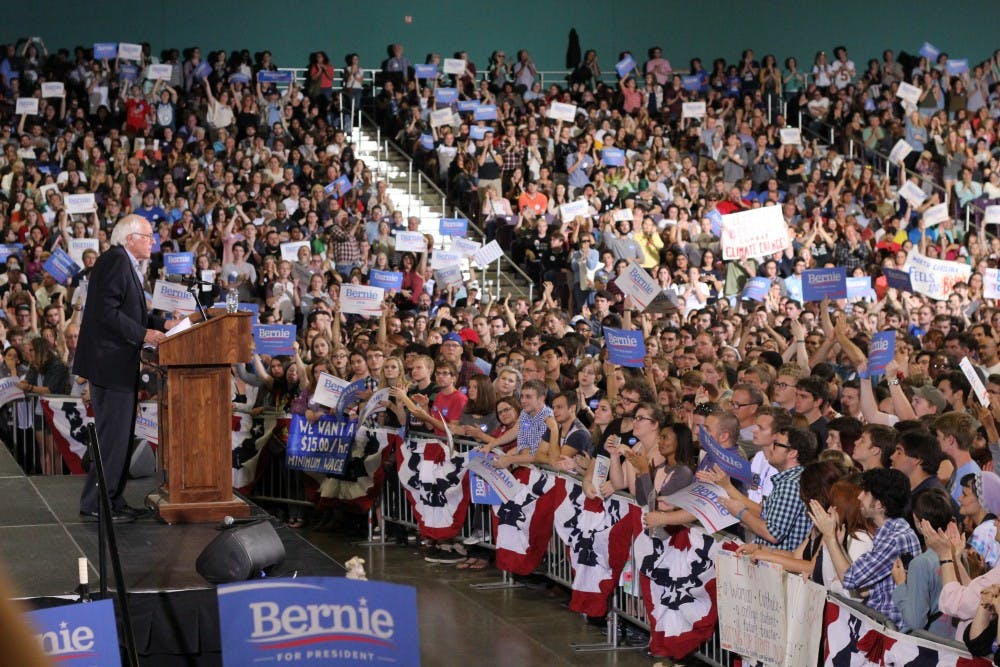Former Secretary of State Hillary Clinton, Gov. Martin O’Malley (D-Md.) and Sen. Bernie Sanders (D-Vt.) outlined their ideas for reforming higher education during the third Democratic Party Presidential Debate Saturday night.
Sanders, a self-identified Democratic Socialist, proposed free tuition at public colleges and universities through a tax on Wall Street speculation.
“My proposal is to put a speculation tax on Wall Street, raise very substantial sums of money, not only make public colleges and universities tuition-free, but also substantially lower interest rates on student debt,” Sanders said.
Others, however, said they had stronger plans.
O’Malley said he would go further than Sanders by increasing investment in Pell Grants, which address room and board and textbook expenses.
“My plan actually goes further than Sen. Sanders because a big chunk of the cost is actually room and board and books and fees,” O’Malley said. “So as a nation, we need to increase what we invest in Pell Grants.”
O’Malley also pointed out that because states have become less involved over time in providing aid for higher education, he would install a block grant program to keep states in the game.
While Clinton encouraged increased involvement at the state level, she said the federal government must incentivize the states to do more.
“Under my compact, the federal government will match money that the states begin to put back into the higher education system,” Clinton said.
She added she disagreed with Sanders’ proposal to make public institutions tuition-free. Rather, she preferred a narrower focus on middle-class families, working families and children living under the poverty line who have the ambition and talent to go to college.
While education reform was a major issue discussed during the debate, income inequality and foreign policy were most frequently discussed.
Miss tonight's #DemDebate? Catch all the highlights in 60 seconds: https://t.co/x9UZaawuyl
https://t.co/29v0d9Ny32
— ABC News Politics (@ABCPolitics) December 20, 2015
One of the more lively exchanges of the night occurred when ABC moderator David Muir asked Clinton whether or not she’d be loved by corporate America.
“Everybody should,” Clinton replied.
When asked the same question, Sanders had a dramatically different response.
“No, I think they won't,” Sanders answered. “So Hillary and I have a difference. The CEOs of large, multi-nationals may like Hillary. They ain't gonna like me, and Wall Street is gonna like me even less.”
WATCH: @BernieSanders: "The greed of Wall Street is destroying this economy." #DemDebate https://t.co/SqXiXDjSiM
— ABC News (@ABC) December 20, 2015
Sanders added said he does not have a Super PA, which limits the influence wealthy donors have on campaign.
O’Malley also addressed Clinton’s relationship with Wall Street executives.
“For my part, I have demonstrated the ability to have the backbone to take on Wall Street in ways that Secretary Clinton never, ever has,” O’Malley said. “In fact, in the last debate — very shamefully — she tried to hide her cozy relationship with Wall Street big banks by invoking the attacks of 9/11.”
Clinton maintained wealthy people are running attack ads against her and said she has more donations from students and teachers than from people on Wall Street.
Foreign affairs also proved to be a divided issue, especially with regard to the Middle East.
Sanders claimed Clinton had a history of not examining the unintended consequences of regime changes, including overthrowing Libya Prime Minister Muammar Gaddafi.
Clinton countered by stating Sanders was acting hypocritically since he voted to overturn the Libyan regime.
With regard to the Islamic State group, Clinton said she would not support sending ground forces. But she did say she supported involvement from Special Forces.
WATCH: @HillaryClinton on ISIS: "They want American soldiers on the ground fighting them." #DemDebate https://t.co/OacCNH4oR1
— ABC News (@ABC) December 20, 2015
Sanders responded by arguing Clinton supported the war in Iraq, which destabilized the Middle East. Sanders advocated for a Muslim-led coalition in Syria with no U.S. presence on the ground.
"The United States must lead,” he said. “But the United States is not the policeman of the world. The United States must not be involved in perpetual warfare in the Middle East."
One key topic going into the debate was Sanders’ campaign downloading voter-related data that belonged to the Clinton campaign. In response, the Democratic National Committee denied Sanders access to his own records.
After Sanders claimed the issue was being resolved and he had regained his voting data, he apologized to Clinton. Following short remarks from Clinton and O’Malley, the data breach was not mentioned for the remainder of the debate.
But perhaps the most memorable moment occurred with Clinton’s closing remarks.
“Thank you, good night, and may the force be with you,” she said.
Top moment on @Twitter during #DemDebate:
@HillaryClinton: "May the force be with you." https://t.co/70XbqCg9QM https://t.co/iIRJ68eRmi
— ABC News (@ABC) December 20, 2015
Following the debate, Clinton and Sanders were tied for the largest share of the #DemDebate on Twitter, according to ABC News Politics. But ABC News Politics also reported Sanders was the most-discussed candidate on Facebook.
The next Democratic Party Presidential Debate is scheduled to air on NBC News Sunday, Jan. 17 from Charleston, South Carolina.


